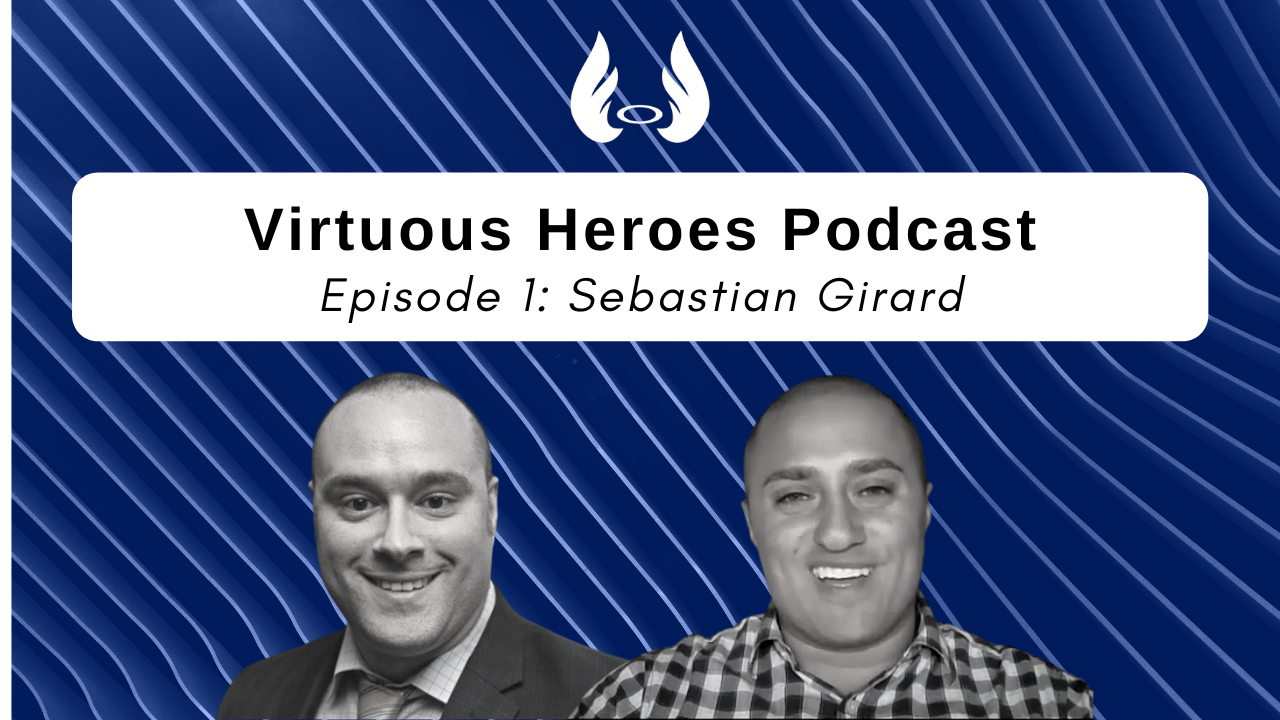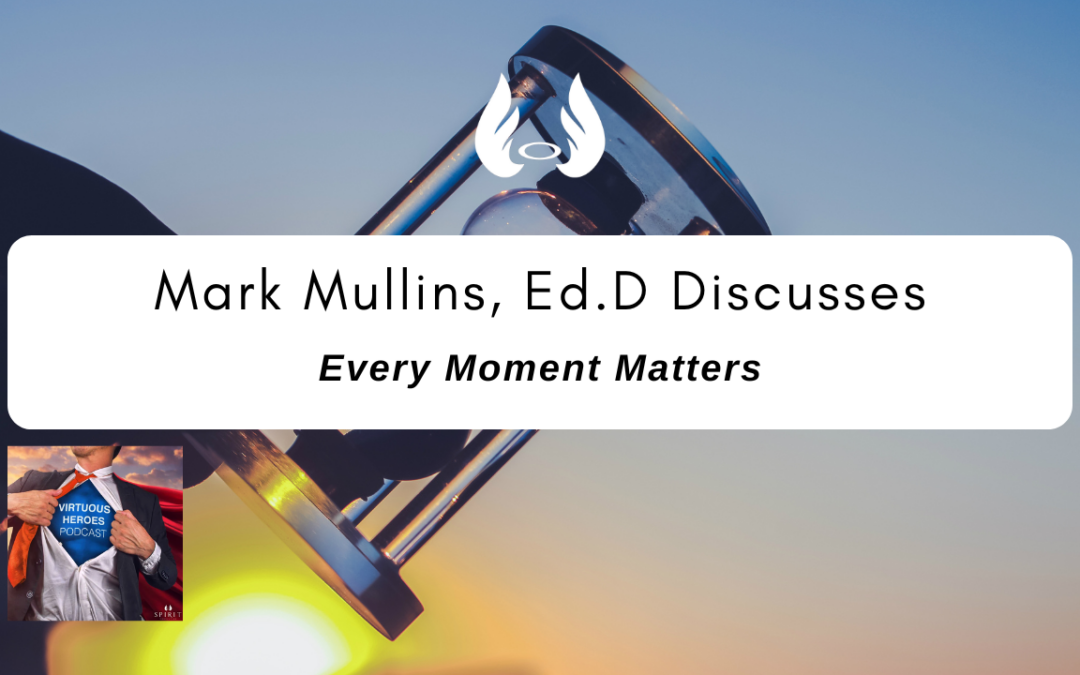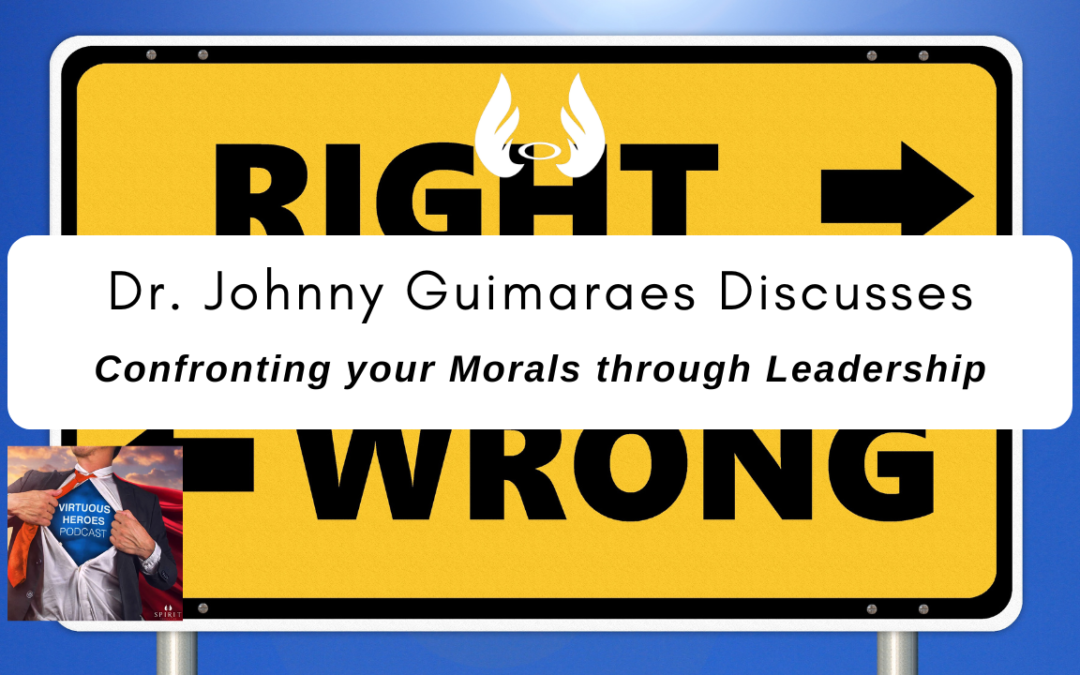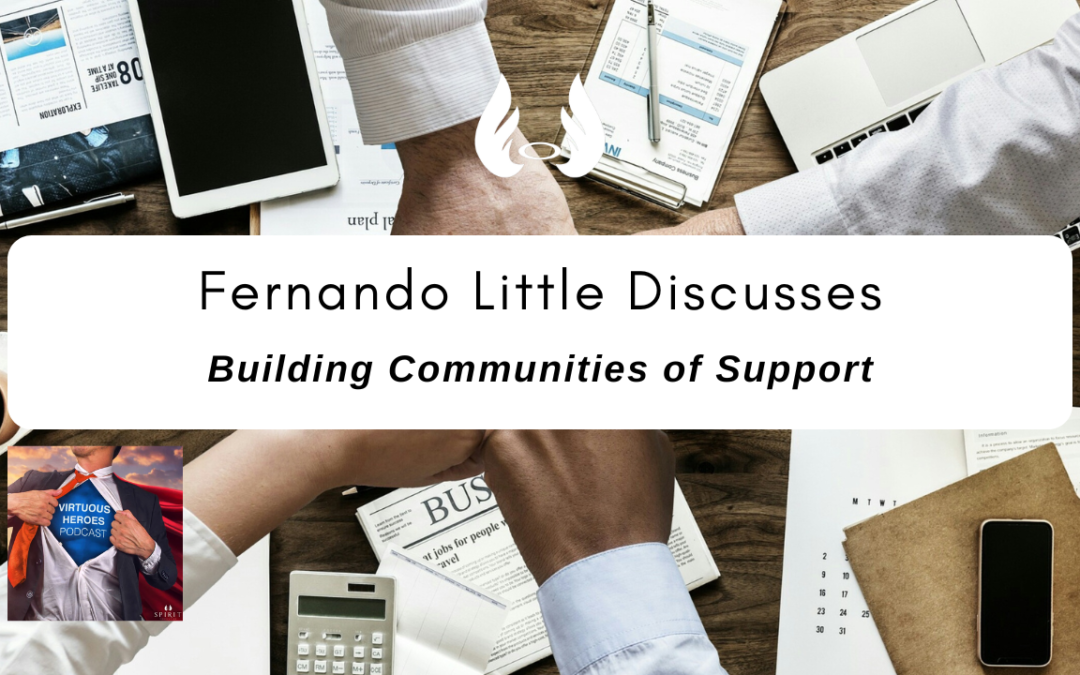Podcast episode
About our Guest
Sebastien “Seb” Girard is the Senior Vice President of Workforce Engagement at Atrium Health, one of the nation’s leading hospital networks and the largest in North Carolina. In this episode, Seb tells Chris about his “mid-life crisis” which pushed him to significantly reconsider his career goals and change as a leader. In doing so, Seb unlocked amazing potential in his work which allowed people in non-profit healthcare to flourish. Seb is a proud father and an inspiring leader, and he is a fantastic first guest of the show.
Episode Transcript
Chris: All right. So excited to be able to have you on the podcast today. Sebastian, thank you for joining us as I was telling you in the intro. So can you tell us a little bit about who you are?
Sebastian: Absolutely. And it’s such an honor to be here today, so truly appreciate the opportunity to talk with you. And I go by Seb. Sebastian is when I’m in trouble. So please call me Seb. So my name is Seth Girard and I’m a senior vice president of workforce engagement for Atrium Health. Atrium Health is a system in the Southeast of the U S. We are in North Carolina, Virginia, South Carolina and Georgia.
And we’re the largest employer of Charlotte, the second largest of the state of North Carolina, just behind, behind Walmart. And as a workforce engagement is basically more leading an HR strategy, the HR business partners, talent acquisition, nurse recruiter. Executive recruiting and also all teammates relations with some emphasis also on teammate experience.
So making sure that our teammates are not just engaged, but committed to an experience through the organization. I’m also a loving father. I have a 24-year-old she’s in Canada. So this weird accent that you’re hearing right now, it’s a French Canadian accent. She lives in Quebec city. I’m from Montreal.
She worked with child protection. So I’m extremely proud dad of the very successful and professional woman that she became. And I have also two little ones, six and a four here at home. And they’re just the joy of my life. So very thrilled to be a dad, a friend and husband, and this VP.
Chris: So I’ve had the opportunity to interact with some of your human resources, business partners, that report to you Seb, and I must admit that yeah, you guys do a wonderful job of finding outstanding individuals and grooming them to continue to progress up the chain as well. All the interactions that I’ve ever had have always been like a ridiculously pleasant experience.
Sebastian: Thanks for saying that. And I would say, I consider myself blessed that they picked our team and they picked a few Atrium Health and that they made the decision, to partner with us that they are fantastic. We’re blessed with an amazing team. But thanks for giving me the feedback. I’m glad that you think so also.
Chris: Yeah, no, no worries. No worries. So can you tell us a little bit about how you got to the leadership position that you’re in today?
Sebastian: Yes. I’ve been the leader for over 20 years. And I had a, of. If the question is leadership and healthcare in HR, I had a bit of a midlife crisis about five years ago where I was an executive in the front office leading a team for, in a for-profit HR provider company.
And it was all for profits. And it was operation. It was not HR. And had a midlife crisis just woke up one day and say, you know what? I want to give back. I want to change why I am as a leader. And I want to do it for another reason than profit bottom line and shareholders. And then started thinking what can that can look like.
And then HR, of course, as the people function it’s driving to people’s stress. So it was like, all right, instead of a curation, I should probably focus on people and then healthcare because of how best to give back to the communities to, to patients, to people in need, then making sure that they receive best care.
So that midlife crisis really drove me to, to those leadership position that I have today.
Chris: Thank you for your vulnerability and sharing that to said. And I think that some people may hear like the, the midlife crisis and stepping up to that, I myself have gone through a quarter-life crisis.
So can you maybe like for people that haven’t been there, can you maybe describe a little bit about what you were feeling like, what did those feelings feel like when you were in that moment in life?
Sebastian: It’s such a great question. It’s the feeling was that what I was doing day in, day out as successful as I am, and I had an amazing career path and I could’ve kept going.
It didn’t feel right. And it didn’t feel that it was me anymore that the drive to generate those profits or those sales dollars. It was not was engaging me or motivating me. And just again, like a thing as a midlife crisis, a need of change and the need of giving back. And it was crystal clear that I felt that my place on this planet was to do something good.
And what is the best way to truly work was to find a job where I could perform in an industry where I could make a difference while giving back. And and, but it didn’t feel right. And. It was a matter of listening to myself. There was not a needs of decision changing industry, changing job in this case, taking a step back to go back up.
So I had to, but I had the first step I had to be back to go back up, not easy, but in terms of accomplishment of self-development of feel-good factor, best decision I made.
Chris: Yep. So what did that conversation look like with your boss? And then what was the feeling like when you were out of the organization?
Where was there a moment of oh man, what do I do? It wasn’t like directly from job to job? Or how did that look like as well, going from job to job.
Sebastian: So I had to change industry and just make a leap of faith. So it was a matter of… Selecting the organization that I thought would be the best for me as the supervisor, right in this case was a CHRO, a CHRO that was welcoming my change and ready to take me for all this tranq.
It was bringing to the table and mentor me for what I had to learn into the new role. It felt good from the get-go from the get-go, that, when it’s not right, when you need to do a change that you didn’t just need the courage to make the. And more often than not, it’s the right thing.
Chris: Yep. So now really diving in for the, for this period of time in employee engagement, in the work that you’re doing, what are some things that, like from a technical expertise space that most people wouldn’t know in leading this function, like what, what is like your big aha moment that you have taken away from your career in this new kind of like direction that you’ve been going?
Sebastian: So it’s a couple things, but I will say, and especially in my case, in terms of HR or leadership. We’re in the business of creating experiences and this is true for every single person you’re interacting to. That can be your the leaders that you’re servicing that can be the community, the patient, or it can be the teammates.
And an experience is going to be way stronger than engagement. And Maya Angelou said it in, in the best word, people forget what you tell them. They’re never going to forget how you make them feel. And if you think about our job as leaders, or even as HR, we’re in the business of making people feel, every interaction we’re having, every training, every crucial conversation, bringing people into the organization, tackling turnover is happening even before the person starts, because if they have an amazing experience before they even have day one.
The chances of them thinking this is the wrong company for them lowered dramatically. So to say again, you see HRs in this experience function, or even a customer service function with that mindset and that you truly have the mindset of leading the people component. So driving the strategy of people for the organization versus being, let’s say more of a tactical function that makes a world of difference.
Chris: I love that. No that’s phenomenal. And yeah, I can, being on the consulting side, dealing with the hiring challenges for organizations it’s, people will sense that and they feel that right off the get, go from like really the interview process is really just like a snapshot into the organization too.
And you can see organizations, being able to support different organizations. You can see. How well do you know, some organizations are and how organized they are in the interview process and candidates experience that too. Yeah. Thank you for sharing that too.
Sebastian: And you’re spot on and we’re in a world where it’s an employee market, right?
So we need to consider ourselves lucky that teammates are selecting us versus them feeling lucky that we selected them. And if you think about creating those experience, you said it right. It’s even started before they even talk with you. So what is their experience when they touch your website?
What’s the experience on apply on applying on the job. They still didn’t talk to you and they already have a strong opinion. Yeah, so taking all those little moments in time and creating the best experience that’s the best way to go.
Chris: Absolutely. Okay, excellent. So now here’s the million-dollar question Seb, can you tell us a little bit in your own career, like where business and virtue has intersected for you?
Sebastian: Yeah, and I will say two things and I’ll tell two stories because it’s. My midlife crisis came out of virtue. Which is, I don’t feel I’m maximizing my talent for the greater good, and I need to find a way to do that. And then of course it’s more the leadership style, but then I want to talk about the mission and value of Atrium Health, because it was a huge component of the reason why I joined the organization Atrium Health as a mission statement and it’s helath healing hope for all.
And I really want to touch on the for, for all means that wherever you are, however you self identified. Whatever’s your gender, the color of your skin. Whether you are Terry Bridgewater with the Carolina Panthers or maybe somebody going through a tough patch that maybe cannot afford care.
We’ll take care of you and we’ll give you the best care and you’re going to have access to the best care. And to me to have this non-for-profit mindset, And that truly gonna help elevate a community and invest in a community for for example lower-income housing, so those are the type of thing that I really look into an organization, and that’s how I bring virtue to mix with the organization and just bring it day in, day out, connecting every single teammate to that mission.
So every time we have interactions with the teammate, is it matching our health healing and hope for all, and wherever you are, whatever your belief will take care of you. And that, that matters to me.
Chris: Yeah. I think that sometimes when you have, audacious and big and hairy, mission statements like that, it’s easy to get watered down.
How do you guys reinforce that? Or how do you remind some of the employees at all levels of the organization that’s why we exist and what we’re trying to accomplish?
Sebastian: Yes. And while we attach it to every single of our communication, we’re reinforcing it with every single executive communication, that did come from our CEO Gene Woods or any of the other executives. It’s a strong reminder, or even the way we do teammates relations. So when we have to deal with some cases, it’s always a reminder. We’re here for all. And there’s also a bit of putting your money where your mouth is or walking the talk, which is you don’t just do it for your system or for your teammates, but it’s a matter of pushing it into the humanities and evolve.
So I’ll give an exam. Atrium is sponsoring many board of director position to make sure we have an impact on their community. So I’m blessed to be on the board of director of Goodwill to be able to make an impact on an organization that their whole mission is to help the underserved. It’s to find that, and then it’s each interaction to reinforce.
We also do it from the get-go it’s an expectation from before the person even start making sure that they understand they’re joining an organization, that we are a non-for-profit and we will provide health healing and hope for all. And it’s, again, it’s just a matter of, I will say though, too, to be honest, it’s not hard to maintain and it’s not hard to to keep top of mind people embrace it in such an amazing.
We’re very lucky that way.
Chris: So what gets you the most excited about the future
Sebastian: While there’s many thing, and I consider myself a futurist. So let me say I’ll quote, Winston Churchill here. We should never let a good crisis go to waste. I think the pandemic right now it doesn’t feel good.
It feel extremely. But I think it’s pushing forward some innovation and disruptions that would have take years to accomplish that we need to accomplish right now. And I’ll give example of the things that we look into Atrium. So we push virtual care, virtual hospitals. Those are things we were doing before, but it was not urgent.
Now we’re doing it full force because it is urgent, but this is also the way of the future. Working remotely artificial intelligence, getting into a market that is even tighter into a pandemic. How do you tackle that as stronger partnership with potential partner that can help us through the pandemic?
So to me, all those components are extremely exciting and some of the upcoming trends in in technology. So everything that can go from the next level in video recruiting. Things like that are extremely exciting for me.
Chris: Yeah. Wonderful. So how can people get ahold of you, what you’re doing or what your organization is doing?
Sebastian: You mean to be able to reach out to me?
Chris: Yes. You know that and to find out more about Atrium.
Sebastian: So they can go on our website, atriumhealth.org, or they can reach out to me at Sebastian with an E, S E B A S T I E N dot Girard, G I R A R d @atriumhealth.org. I’m also on LinkedIn. So please reach out to me on LinkedIn.
I love connection. I think network is one of the most important thing we have to do as leaders as we are get better so please reach out to me.
Chris: Great. Thank you. And I’ll, we’ll have that information up on the screen too. So thank you so much SEB. It was so great to be able to connect with you on the show and to share what’d you guys are working on Atrium.
I think there’s a lot to unpack here, so thank you so much as well as again.
Sebastian: Thanks for having me always a pleasure!









0 Comments